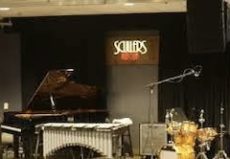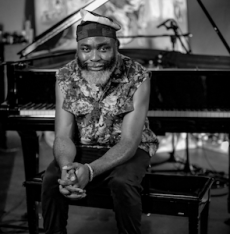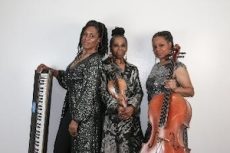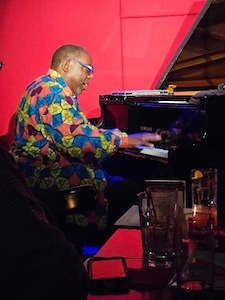
The Jazz Voyager
The coast to coast flight has the Jazz Voyager sleeping on the red eye heading east for a taste of jazz in the town where the tea party took place, Beantown as some call it or Boston, Massachusetts. The venue is Scullers Jazz Club and it has a small stage where jazz and soul legends as well as new talent perform in this intimate supper club with a background of river views.
This week I’ll be in the company of pianist, composer and arranger Jon Cowherd who is best known as the co-founder and co-director of Brian Blade and the Fellowship Band. He has worked extensively as an arranger, producer, songwriter and accompanist with a vast range of artists, such as Cassandra Wilson, John Scofield and Lizz Wright to Joni Mitchell, Brandi Carlile, Rosanne Cash, Norah Jones, Glen Hansard and more.
Scullers Jazz Club is located at 400 Soldiers Field Road 02134. For more information visit https://scullersjazz.com.
More Posts: adventure,bass,club,genius,guitar,jazz,music,piano,preserving,saxophone,travel

NDUDUZO MAKHATHINI
Nduduzo Makhathini grew up in the lush and rugged hillscapes of umGungundlovu in South Africa, a peri-urban landscape in which music and ritual practices were symbiotically linked. The area is significant historically as the site of the Zulu king Dingane kingdom between 1828 and 1840. It is important to note that the Zulu, in fact the African warrior code, is deeply reliant on music for motivation and healing. This deeply embedded symbiosis is key to understanding Makhathini’s vision.
The church also played a role in Makhathini’s musical understanding, as he hopped from church to church in his younger days in search of only the music. The legends of South African jazz are deep influences as well, Bheki Mseleku, Moses Molelekwa, and Abdullah Ibrahim. “The earlier musicians put a lot of emotions in the music they played,” he says. “I think it may also be linked to the political climate of those days. I also feel there is a uniqueness about South African jazz that created an interest all around the world and we are slowly losing that too in our music today. I personally feel that our generation has to be very conscious about retaining these nuances in the music we play today.”
Through his mentor Mseleku, Makhathini was also introduced to the music of John Coltrane’s classic quartet with McCoy Tyner. “I came to understand my voice as a pianist through John Coltrane’s A Love Supreme,” he says. “As someone who started playing jazz very late, I had always been looking for a kind of playing that could mirror or evoke the way my people danced, sung and spoke. Tyner provided that and still does in meaningful ways.” Makhathini also cites American jazz pianists including Andrew Hill, Randy Weston and Don Pullen as significant influences.
The Band: Nduduzo Makhathini – Piano | Zwelakhe Dumas Bell Le Pere – Bass | Francisco Mela – Drums
Cover: $80.00 | Dinner & Show
More Posts: adventure,bandleader,club,genius,instrumental,jazz,music,piano,preserving,travel

FIERY STRING SISTAS
At the core of Firey String Sistas are three powerhouse women, Nioka Workman (founder),Marlene Rice and Mala Waldron. Together they infuse world, global funk, ‘head bopping’ soul and Jazz music to produce a unique sound for violin, cello, bass, piano and percussion. The Firey String Sistas extend from 3 to 5 members, featuring cutting edge acoustic and electric musicians. The ‘Sistas’ presentations include tone portraits of the current times, reflections of women’s culture and a celebration of family traditions. The ensemble’s first recording received overwhelming critical acclaim with the press saying; “ ….there’s enough energy in Firey StringSistas to fire up a constellation….deeply personal, naturally expressive playing….whets the appetite for further releases.” – Raul da Gama (Jazz daGama ). “,….eight fun and swingingoriginals.
The team literally shows pluck…a treat” -George Harris (Jazz Weekly) “ ….. a charming and delectable work by .. supremely talented musicians. It is simultaneously accessible and sophisticated, poignant and erudite and, as such, should have a wide appeal. It certainly whets the appetite for more to come…..” -Hrayr Attarian (All About Jazz) . After the success of CD “That’s What She Said” , the Firey String Sistas have begun to record their sophomore CD with dedications to icons, Maxine Waters, Michelle Obama and Mal Waldon This CD also includes surprise features of renowned Jazz artists sprinkled in. Firey String Sistas are recipients of the South Arts Jazz Tours 2023 for performances at Outpost Performing Center, Albuquerque and SITE Museum, Santa Fe Jazz Collective in New Mexico.
Tickets: $35.00~$110.00
More Posts: adventure,bandleader,bass,cello,club,genius,instrumental,jazz,music,percussion,piano,preserving,travel

Requisites
Swiss Movement ~ Les McCann and Eddie Harris | By Eddie Carter
This morning’s record from the library is an exceptional live album by Les McCann and Eddie Harris. They performed a spontaneous concert at the 1969 Montreux Jazz Festival. Their set, which became the highlight of the three-day event, was a testament to the quintet’s exceptional musicianship. Swiss Movement (Atlantic SD 1537) immortalizes this incredible performance. The ensemble consists of Benny Bailey on trumpet, Eddie Harris on tenor sax, Les McCann on piano, Leroy Vinnegar on bass and Donald Dean on drums. My copy is the original 1969 U.S. Stereo release.
The opener, Compared To What by Gene McDaniels, is a poignant reflection of the sentiments of many Americans towards the Vietnam War and the President of the United States. McCann’s vocals, which delve into the pressing issues of the time, add a layer of historical significance to the song. Les starts things with a spirited introduction, setting the stage for a lively dialogue when Donald joins in. Leroy and Eddie add to the jubilant theme with McCann’s vibrant vocal choruses. Benny follows with a zestful solo, and Les returns for another round of swinging. He then lets his fingers do the talking with exhilarating energy. Eddie takes the performance to a whole new level next, leading to an electrifying climax, the audience’s thunderous applause, and McCann’s quintet introduction.
Cold Duck Time by Eddie Harris slows the pace to medium speed, opening with Les McCann’s introduction to the crowd. Leroy and Donald build the song softly to the quintet’s relaxing theme. Eddie starts the soloing with a nice, easygoing groove. Benny delivers the following solo with thoughtful construction and captivating lines. Les ends with a contagious swing on the closer, which cooks to the finale. Kathleen’s Theme by Les McCann ends the first side with Harris leading a quartet performance. Eddie delivers a feisty reading with a spirited momentum fueled by the rhythm section’s groundwork, which receives a well-deserved ovation from the Montreux audience at its conclusion.
Les McCann’s You Got It In Your Soulness opens Side Two with the trio’s festive introduction to Les scatting along in the background of the melody. He continues taking care of business on the first solo. Eddie launches a funky, firm-toned attack next. Benny responds with energetic verses in the following reading, and Les puts the exclamation point on the solos with intense heat, which glows brightly into the close. The Generation Gap by Les McCann starts with the trio’s introduction and melody. Eddie begins with a velvety, smooth opening statement. Les delivers a stimulating workout before the trio’s gentle ending.
Nesuhi Ertegün and Joel Dorn produced Swiss Movement, and French recording engineer Pierre Grandjean crafted the album with meticulous diligence to detail. The album boasts an excellent soundstage with a “you are there” feeling, immersing the listener in the Montreux Jazz Festival audience as the group performs. The record is also quiet until the music begins. As for the music itself, Swiss Movement by Les McCann and Eddie Harris is a testament to the highest standards of jazz, a live performance that rocked the house that night and continues to captivate audiences today. If you’re a soul jazz or post-bop fan, it’s a must-have for your library!
~ Compared To What – Source: Wikipedia.org
© 2024 by Edward Thomas Carter
More Posts: choice,classic,collectible,collector,history,instrumental,jazz,music,piano,saxophone

CYRUS CHESTNUT TRIO
For a decade starting in the mid-1980s, Cyrus Chestnut apprenticed as pianist for Jon Hendricks, Betty Carter, Donald Harrison and Wynton Marsalis. But since then, he’s toured the world and recorded many albums under his own name and has traveled the world with his own trio.
TICKETS: $35.00~$150.00
More Posts: adventure,bandleader,genius,instrumental,jazz,music,piano,preserving,travel



